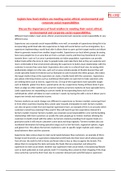Explain how food retailers are meeting social, ethical, environmental and
corporate social responsibilities
Discuss the importance of food retailers in meeting their social, ethical,
environmental and corporate social responsibilities.
Different food retailers meet social, ethical, environmental and corporate social responsibility in very
different ways.
Superstores use corporate social responsibilities very well, an example of superstores doing this is by
incorporating world food aisle into superstores to help with social factors such as immigration, by a
superstore implementing a world food aisle it allows them to open up their target market and allows
them to generate money from another target market. Superstores use local ethnic groups by seeing
how many people live in an area that are from a certain country and then buy food/stock in to cater
towards them, such as if an area is predominately an Indian population, superstores can provide
Indian foods within the store to cater to people tastes and make them feel as they are welcome and
more comfortable in that environment allowing the superstore to build a loyal relationships with the
customer to ensure they come back. Superstores also cater to a cultural local area, by seeing what
predominate religion is in the area, such as if an area contains people of Muslim descent they will
create speciality foods for festivals such as Ramadan to cater towards the ethnic groups, this makes
the target market shop at the superstore an create a loyalty bond with the customers. Superstores
also allows informing choices such as nutritional information on each item to help customers who
are seeking items such as low fat, sugar free etc. On top of this superstores have specialist ranges
such as diabetic, gluten free items, special spices etc.by a superstores having all these items it give
them an edge on other outlets such as farmer markets as farmers markets not have specialist items.
Lastly superstores are responding to current trends by incorporating items such as low
carbohydrate, which will allow to meet customer’s needs, by having this with a store it allows you to
target new trends and maximize income.
Farmers markets use social change very different to superstores as farmers markets cannot get food
in from other countries meaning they cannot cater towards immigration to well, farmers markets
can also not grow certain fruit and veg that superstores have, an example of this is an avocado which
customers cannot buy meaning if they want it they will need to go into superstores instead of a
farmers market, however farmers markets use corporate social responsibility’s very well by building
relationships with their customers as usually the same people go to farmers markets allowing the
customers to build a bond with the sellers, by farmers markets providing fresh organic foods at a
good price point it will ensure customers come back and shop regularly. Farmers markets also use
nutritional information by having specialist ranges such as low fat foods, vegetarian options, vegan
and gluten free. This allows the farmers markets to cater to specific target markets and creates a
bond between them and the customer.
Superstores take various steps to meet social needs between thee customers, an example of this is
foreign travel (tourism) as superstores implanted world foods into their store which allows people
from all over the world to fell at home and know what to buy as they recognise the brands. This
allows them to recognise the taste and enjoy the foods that are presented, and allows the
superstore to meet social needs. Another way superstore meet social needs, it by balancing lifestyle
such as work patterned as most parents work 9-5 meaning they cannot do their shopping if the shop
close early they cannot by their food, due to customer demand and work/life balance superstore


